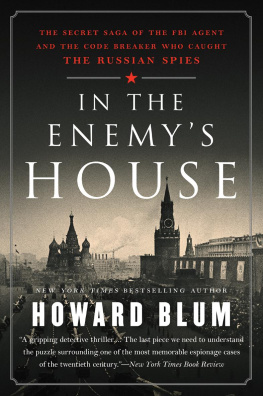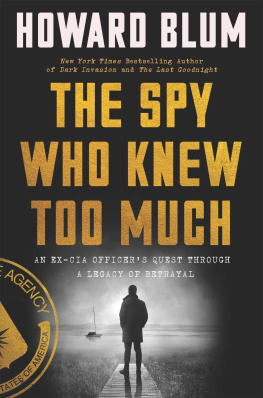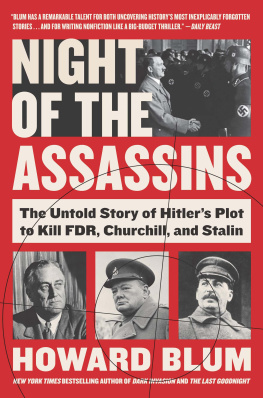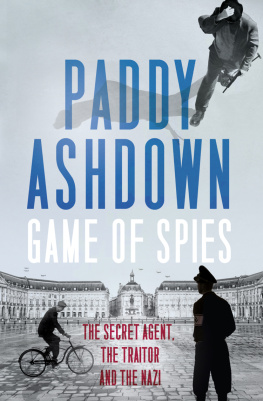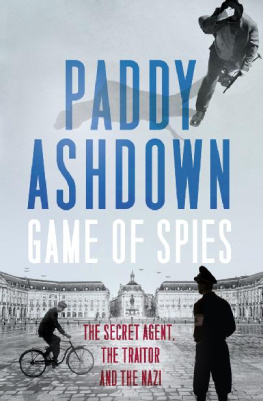B OB L AMPHERE STARED AT THE phone, waiting, willing it to ring. It was the tail end of the afternoon on a perfect late spring dayJune 19, 1953in Washington, D.C., the time of day when Bob liked to have a restorative scotch and soda. Instead, Bob, usually so rock steady, calm even in crisis to the point of detachment, found himself in the fifth-floor office of his boss, the assistant director of the FBI, anxiously staring at the phone. Waiting.
If there was one thing Bob should have learned in his twelve years as an FBI agent, in all the long days and longer nights hed spent on espionage cases, it was how to wait. He had sat in parked cars until his legs grew stiff, stood with stolid discipline under leaky awnings in the teeming rain, huddled down low in his seat in the back of movie theaters. Physical surveillance, the Bureau manual insisted, was an essential skill for fieldwork. Any agent, especially one like Bob who had risen to the rank of supervisor in the Intelligence Division, either learned patience or went looking for another job. But there had never been a wait like this.
Bob tried telling himself he had done what he could. He had writtendamn the consequences!a blunt memo to J. Edgar Hoover stating that the facts of the case were clear: at the very least the wife did not deserve her sentence. She should not be executed. And the director, in a response that filled Bob with both surprise and a measure of respect, swiftly put this argument into a letter that he signed with his looping schoolboy cursive and had hand-delivered to the judge.
The judge, however, would not be persuaded. He was adamant. If the prisoners did not cooperate, the sentence would be enforced just before nightfall.
Now all Bob could do was stare at the phone. It was a direct line to the death house in Sing Sing prison. Al Belmont, the hard-edged, by-the-book assistant director of the FBIs Domestic Intelligence Division, whom Bob had known since their quarrelsome days years ago working in the New York field office, was in charge of the command post. In Belmonts suit jacket pocket he had a typed list of questions that Bob, in a wishful burst of optimism, had helped prepare; two stenographers were on call in an adjacent room. And farther down a long, dimly lit prison corridor, behind a steel door with the word Silence above the lintel, was the electric chair.
There would be two reasons for the phone to ring in the fifth-floor office in the Justice Department Building in Washington. Either the two prisoners had finally agreed to provide pertinent information. Or they would have received three jolts of electricity2,000 volts for three seconds, dropping to 500 volts for fifty-seven seconds so as not to cook the flesh; another 2,000 volts, steadying to 500 volts; and a final 2,000-volt surgeand were now dead.
The office grew crowded, and Bob knew all the newcomers; he had done some things, been in some difficult places, with a few of them. But Bob was in no mood for reminiscing. He remained quiet, aloof, locked in his own tight circle of dread.
After a while, Bobs eyes wandered absently about the room. Heavy blue curtains framed a double window, and when he looked out he saw that long, gray shadows were starting to stretch across the courtyard below: the sun was setting. And all at once his blood ran cold.
A T ABOUT THE SAME TIME, a half-hours drive into suburban Virginia from downtown Washington, Meredith Gardner, Bobs unlikely collaborator and, no less improbably, good friend, was suffering his own pangs of guilt.
The evening in the modest one-story ranch that sat in the cul-de-sac off Old Dominion Drive had been, at least at first, routine. Meredith had been determined to push from his mind the grim events unfolding in Sing Sing prisonand the role he had covertly played in this drama. Restraint was natural to his demeanor, just as it was a necessity in his secret life.
And so, as usual on Friday night, there had been a family dinner; Blanche, a Phi Beta Kappa graduate of Mount Holyoke who had done her own hush-hush government work during the war, cooked for her husband and the two children. After the table was cleared and the children had gone off to play, Meredith, his tie still knotted tightly, a glass of sweet sherry within reach on the end table, sat in the living room with his wife. They were at opposite corners of the room, each in identical wing chairs covered in an identical floral print, each with a book in their hands. What were they reading? It could have beenalmost literallyanything. The family library was both obscure and eclectic. A Slovak grammar primer, a Spanish-language history of Turkey, an analysis of slavery in the Bible, a ChineseRussian dictionaryall were well thumbed. Books crowded the small house like wild, entangling vines. Volumes spilled out from a pair of tall, mahogany-stained bookshelves, cluttered tabletops, and were stacked in knee-high piles on the floor so that walking from one room to the next was as difficult as navigating a maze. Meredith relished this evening ritual, this period of quiet community with his wife; and tonight it was a refuge that was deeply needed.
Then suddenly the lights in the house went out. And in that same moment, their eight-year-old son, Arthur, let out a hair-raising howl.
Meredith hurried into the childrens room. He found his frightened son with his thumb wedged into the wall socket, and Ann, their four-year-old daughter, sitting complacently in the electric chair. Or that was how a teary Arthur, after his finger, albeit without most of the nail, was carefully extricated from the socket, identified the contraption in which he had placed his little sister.
A good deal of planning had clearly gone into building the device. Arthur had taken the childs car seat from the family Studebaker, wrapped the frame with a pair of wires connected to the transmitter that powered his electric trains, and then attempted to complete the electrical circuit by inserting the wires into the socket. Hed imagined a burst of electricity surging up through the car seat and giving his sister a mean tickle. Instead, hed managed to short all the fuses in the basement fuse box, and given himself the shock of his life.
Once hed gotten the lights back on, and was certain that neither of his children was seriously injured, Meredith confronted his son.
What in heavens name were you thinking? he demanded. Why of all things would you want to build an electric chair? Merediths voice was, as always, soft, measured, precise. Yet there was a telltale clue to his mood: when he was angry, a Southern twang, the vestige of a childhood in Mississippi and Texas, would become more pronounced. At this moment, the lilt was unmistakable.

